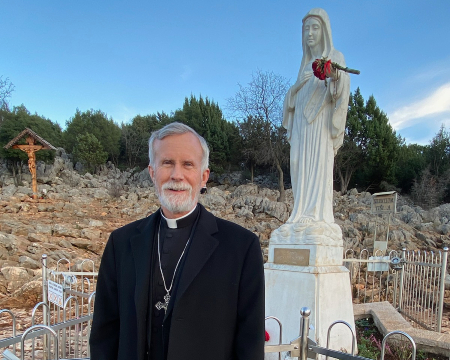We ask you, humbly: don't scroll away.
Hi readers, it seems you use Catholic Online a lot; that's great! It's a little awkward to ask, but we need your help. If you have already donated, we sincerely thank you. We're not salespeople, but we depend on donations averaging $14.76 and fewer than 1% of readers give. If you donate just $5.00, the price of your coffee, Catholic Online School could keep thriving. Thank you.Help Now >
Ancient school in Egypt reveals ancient kids were pretty much the same as kids today
FREE Catholic Classes
Archaeologists have made a particularly exciting discovery at a site in Egypt. The discovery features Greek writings on the walls of a school that reference Homer's "The Odyssey." The school site exists in the modern town of Amhedia (ancient Trimithis), about 200 miles west of the Nile.
Highlights
Catholic Online (https://www.catholic.org)
2/18/2014 (1 decade ago)
Published in Africa
Keywords: School, Egypt, Trimithis, walls, painting, writing, Odyssey, similarities, Hypatia, Alexandria
LOS ANGELES, CA (Catholic Online) - An ancient school site in Egypt reveals a little about education in ancient Egypt during the time of the Roman Empire. The site is about 1,700 years old and dates to a time when the Romans ruled the region.
During the period of Roman rule, Egypt was a center of learning and advancement. Many great thinkers lived and worked there including the female scholar Hypatia as well as several early Church leaders. The Great Library of Alexandria was a repository of ancient knowledge and people from around the Roman world came to Egypt to learn.
The school itself was used for less than 20 years, according to archaeologists and was subsequently incorporated into a larger house. It's unclear, but either the students, or more likely, the owner of the house had painted on the walls images of the Classical gods.
In addition to the paintings, archaeologists have found writing on the walls of the house which they say proves learning took place there. Some of the writing suggests a lesson in literature, featuring Homer's "The Odyssey" took place there. The writing on the wall instructs students copy a passage from the story where Helen of Troy provides instructions for the administration of a drug that would cure grief and anger for the day and bring forgetfulness. Scholars speculate the drug might have been an opiate.
Other inscriptions painted on the walls exhort students to excellence and to work hard.
The school fell out of use within just 20 years, likely because the teacher died or moved on. Schools at that time were often transitory affairs, as opposed to long-standing, permanent features of a community. They were usually associated with a single teacher. Education was a privilege of the wealthier citizens who could afford to pay for it.
What is most striking about the discovery is its parallel to the modern classroom. In schools today, artwork adorns walls, lessons are inscribed on chalkboards, whiteboards, or the most modern equivalent, the "smart board"-which is an electronic equivalent with added features. Despite the modern twist, inspirational posters and quotations which urge students to work hard and give their best are commonplace today. To see that teachers did the same for their students 1,700 years ago reveals that there isn't as much difference between the people of today and then as popularly thought.
Despite the great learning that took place in Egypt, the library of Alexandria was largely destroyed in 391 AD, upon decree from the Christian patriarch there. The library was closely associated with paganism and its influences and the Roman Emperor, Theodosius I outlawed paganism in that year in favor of Christianity.
Hypatia was killed during a riot in 415 AD, accused of pagan and satanic crimes, although these accusations are largely thought to be based on the writings who were more afraid of her influence with women and the learned class.
Although the early Church bears much responsibility for ending the practice of classical, pagan education as beautifully demonstrated by the discovery of the school from ancient Trimithis, the Church replaced this education with Christian institutions of learning which persisted for centuries in Egypt and continue to teach students around the world today.
Despite the differences and the difficult, and at times tragically violent transition, there remains many profound similarities between the world of education today and that of the ancient world. It is from these similarities that we understand that while the chalkboards may give way to iPads, the human element remains precisely the same.
Pope Francis calls for your 'prayer and action'...
---
'Help Give every Student and Teacher FREE resources for a world-class Moral Catholic Education'
Copyright 2021 - Distributed by Catholic Online
 Hi readers, it seems you use Catholic Online a lot; that's great! It's a little awkward to ask, but we need your help. If you have already donated, we sincerely thank you. We're not salespeople, but we depend on donations averaging $14.76 and fewer than 1% of readers give. If you donate just $5.00, the price of your coffee, Catholic Online School could keep thriving. Thank you. Help Now >
Hi readers, it seems you use Catholic Online a lot; that's great! It's a little awkward to ask, but we need your help. If you have already donated, we sincerely thank you. We're not salespeople, but we depend on donations averaging $14.76 and fewer than 1% of readers give. If you donate just $5.00, the price of your coffee, Catholic Online School could keep thriving. Thank you. Help Now >








 Daily Readings for Saturday, April 20, 2024
Daily Readings for Saturday, April 20, 2024 St. Marian: Saint of the Day for Saturday, April 20, 2024
St. Marian: Saint of the Day for Saturday, April 20, 2024 Children's Prayer For Parents: Prayer of the Day for Saturday, April 20, 2024
Children's Prayer For Parents: Prayer of the Day for Saturday, April 20, 2024

